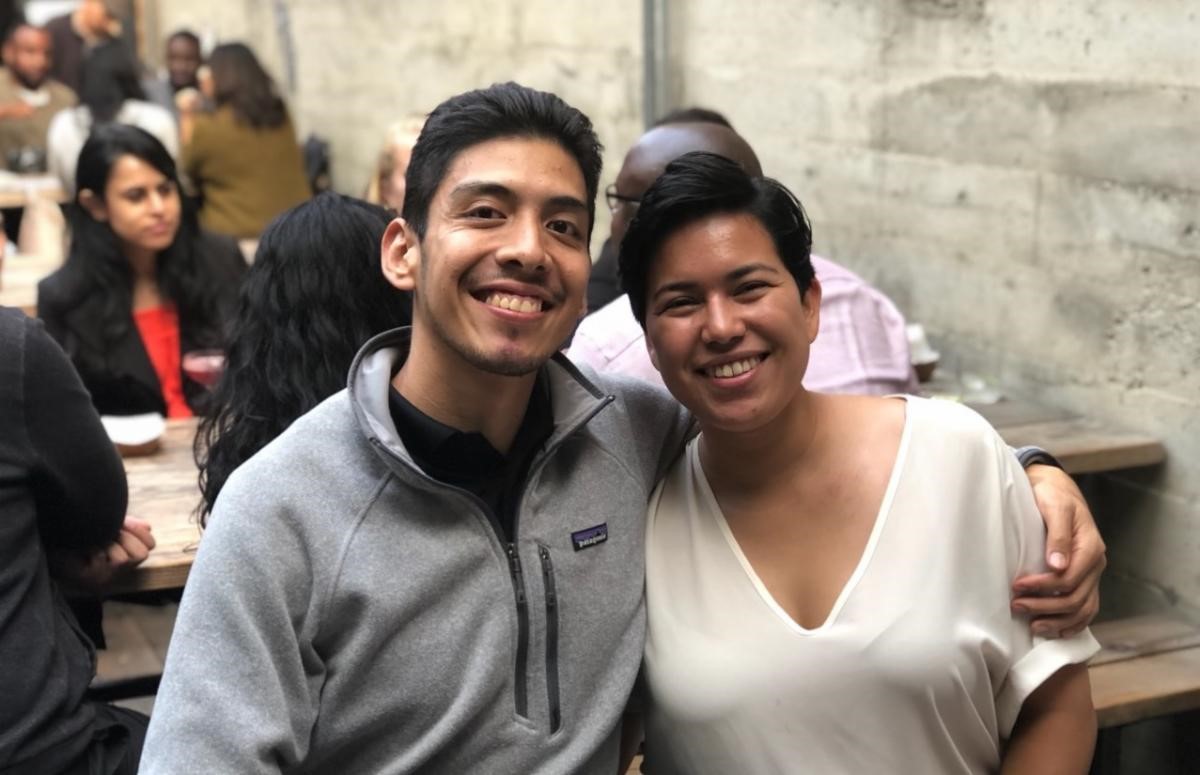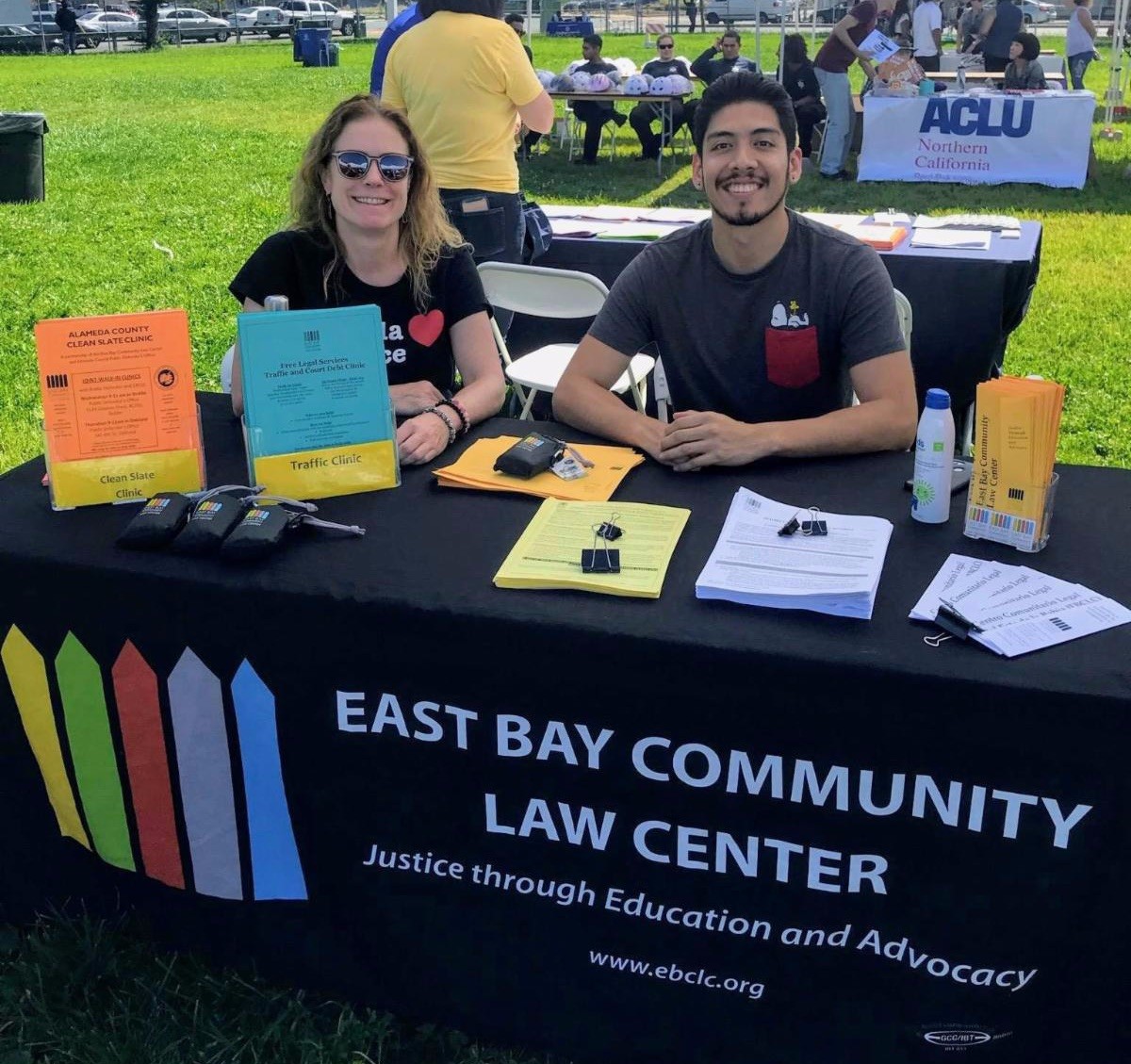It is with great joy that we share with you all today that our Clean Slate Program Coordinator Juan M. Cabrales will be joining Berkeley Law’s Class of 2023 and was awarded the Berkeley Law Opportunity Scholarship covering all tuition expenses!
Juan, a San Diego native, brought his immigration expertise to EBCLC in 2018 as the first Clean Slate Program Coordinator dedicated to “Crimmigration” work. EBCLC is currently one of the only legal service providers in Alameda County that offers crimmigration services at no cost to predominantly low-income people of color. Juan is the son of Mexican immigrants and a first-generation college – and now law school – student. He knows first-hand the impacts over-policing has had on immigrant communities and the vital need to remedy both the broken immigration and criminal justice systems. We interviewed Juan to get an insight into the important work he has done at EBCLC, his journey to Berkeley Law, and the crucial need for reentry advocacy for immigrants during COVID-19.
Juan M. Cabrales, Berkeley Law ’23, EBCLC Clean Slate Program Coordinator with Rebecca Romero, EBCLC Immigration Paralegal
Q: What brought you to EBCLC and how was the process of pioneering crimmigration at EBCLC?
A: I joined EBCLC because I wanted to work with an organization that provides a holistic approach to serving low-income clients. In both a personal and professional sense, I have found that people are not usually navigating a single issue; they face multiple barriers to justice and need more legal assistance than most single providers can offer. EBCLC is unique in this regard with its diverse and outstanding programs. Many of our staff members come from the same communities that the current legal system is negatively affecting, and we are always looking to disrupt and dismantle systemic oppression. I was also deeply impressed with EBCLC’s additional mission to train future social justice lawyers – I am living proof of this.
During my interview, I was told the Crimmigration Program Coordinator position was new to EBCLC, and that there would be no one to guide me. Nevertheless, this made me excited to take the job and I always felt supported by my team. The biggest challenge was realizing that sometimes there is nothing we can do; no legal option currently available to help our clients. On the other hand, when our advocacy results in clients obtaining immigration relief or becoming a U.S. citizen, it speaks to the impact we can have. Minimizing deportations and increasing access to citizenship is another way of ensuring families remain united. This is at the root of our work.
I helped streamline our crimmigration services here at EBCLC to ensure that we weren’t just offering this service but meaningfully moving cases forward to clients who had nowhere else to turn. Our Clean Slate Clinic has a very high client volume and having a staff member specifically dedicated to our crimmigration work has helped our capacity to take on these cases, which are typically very time-intensive. I also developed relationships with community partners to increase our outreach.
Q: What is “Crimmigration” and how does it complement the work we do at EBCLC?
A: This question deserves a longer answer, but the oversimplified description would be that crimmigration is the middle ground, the overlapping between criminal and immigration law. When an immigrant has contact with the criminal system it often also has a direct impact on their immigration status, their eligibility for an immigration benefit, and ultimately their ability to remain in the country. My job is to help our attorneys determine the best advice and strategy for immigrants on both the re-entry and immigration law side. This will depend on whether the client is in deportation proceedings, seeking citizenship, or seeking legal status in the U.S.
EBCLC is exceptionally positioned to offer crimmigration services. Our holistic approach allows clients to go through our Clean Slate Clinic, which supports the reinstatement of people with conviction records, and simultaneously our Immigration Clinic, which provides direct immigration legal services. Immigrants who had contact with the criminal justice system are often unaware that they may be eligible for record clearing or that this is even an option. People shouldn’t be punished twice for being convicted, but this is exactly what’s done to immigrants by the criminal and immigration legal systems. The narrative that they’re not worthy of remaining in this country is at best misguided, at worst outright racist. It’s no secret that in our society, low-income communities of color are disproportionately targeted by the criminal and immigration systems whose main objective is punishment and family separation rather than rehabilitation.
Q: How has the current administration impacted Crimmigration and how do you see the field changing in light of COVID-19?
A: Learning to navigate the current administration has been a challenge. Policy is ever-changing and the actions of our government have not been favorable. The legal battle between state and federal remedies continues to impact immigration law. Marijuana is illegal at the federal level and this creates an additional barrier for clients who may experience its legality at a state level. The federal government is resistant to enacting humane, rational and progressive laws that would provide immigrants with post-conviction relief, but we have seen a spike in people seeking citizenship because they want to vote, they want to participate in our democracy, and they want to ensure their families will remain united. We need to send the message that they belong – that if this work can’t continue, this is what we stand to lose.
COVID-19 has presented many challenges to low-income immigrants. My mother works cleaning houses and my father works in a family Mexican fast food restaurant. Both of them have seen their hours substantially reduced and I worry about them making the month’s bills. This reality extends to the millions of immigrants currently in the state of California. Not to mention the thousands of immigrants currently working in the fields of the Central Valley, putting their health on the line to ensure the market shelves remain stocked – jobs that have gone from being considered so-called “low-skilled labor” to “essential work.” Finally, there are thousands of immigrants in detention centers who are receiving news of a positive diagnosis. The conditions in these detention centers are abysmal and many were placed there for low-level crimes or the “crime” of seeking a better life. Many courts are either closed or severely reduced in the number of cases being heard. This means more time behind bars. With layoffs, it means harder decisions to make at the end of the month. I doubt much money will remain for the legal representation that can ensure release, ensure family unity, ensure a chance at a life with dignity. Non-profits like EBCLC will be more vital than ever and I’m proud that we’re going to continue our crimmigration work after I leave.
Q: What motivated you to pursue Berkeley Law and how did EBCLC prepare you for law school?
A: I didn’t always want to go to law school. I didn’t really understand the legal landscape and all the different things you can accomplish with a law degree. During my first job as a case manager for unaccompanied minors in San Diego, I worked to reunify children with their parents. While it was inspiring to see family reunifications, I knew that the minor’s immigration case would still be pending. A law degree would allow me to do more for my client. Now, with the opportunity I have to work closely with our students and see the dedication they bring to our work and our clients, in addition to the proximity EBCLC has to Berkeley Law, I am convinced that Berkeley Law is where I want to be educated and work to become an outstanding public interest attorney.
A big part of my journey to law school was the help I received from staff attorneys at EBCLC who mentored me, answered all my questions, gave me honest, practical advice, and wrote my letters of recommendation. After hearing all their advice, I was convinced that Berkeley Law was the place for me. I will also take with me a valuable lesson I learned during my time at EBCLC: just because things have historically been done a certain way, it doesn’t mean they have to stay this way. EBCLC is always looking to impact change broadly with policy or impact litigation. This has given me the confidence and agency to take action and try to change systems to create a more equitable society for low-income people. Finally, a number of our staff are attorneys of color and that is inspiring to me and speaks to the broader message of the importance of diversity and representation in the workplace. They’re cheering me on, and I know they have my back, and I have theirs.
–
We thank Juan for his contributions to EBCLC, our clients, and our staff, and we look forward to learning all about his new endeavors at Berkeley Law. We are excited to welcome our new Crimmigration Program Coordinator, Ana Vazquez Pulido.
COVID-19 has presented new challenges for our clients and staff. With unemployment rates at an all-time high and the federal government’s implicit neglect of the undocumented community in all virus reliefs, services like post-conviction relief will be at a dire need. Advocates like Juan, who rise to the challenge, are at the center of EBCLC’s mission to create more just and hopeful communities but they need your support.
Juan with Maureen Kildee, JD, EBCLC Clean Slate Clinical Supervisor and Staff Attorney

